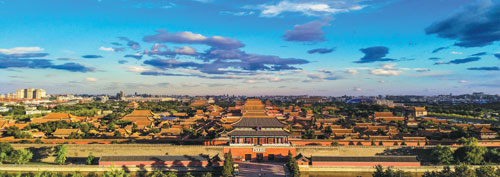Capital boasts treasure trove for tourists to discover
Beijing, capital of China and the nation's center of politics, culture, international communication, science and technology, has a history of more than 3,000 years and boasts ancient and modern tourism attractions.
The Temple of Heaven and the Palace Museum, as well as the Beijing Daxing International Airport, which opened to the public in September and dubbed by The Guardian newspaper as one of the "seven wonders of the modern world near completion", are just a few of the city's tourism resources.
Seven world cultural heritage sites such as the Forbidden City, the Great Wall, the Summer Palace and the Ming Tombs, as well as many other places of interest, have attracted tourists from all over the world.
Visitors can also experience the laid-back lifestyle found in the various hutong and courtyards that stretch out across the city. Classic operas such as Peking Opera and some of the country's cultural heritages are relished by locals and visitors alike.
Visitors can also experience traditional Chinese medicine, the finest silks and ancient shoemaking culture by visiting time-honored pharmaceutical company Tong Ren Tang, Ruifuxiang Silk Store and China's oldest handmade cloth shoe brand Nei Lian Sheng.
Quan Ju De and Bian Yi Fang are famed for Beijing's iconic roast duck, and Dong Lai Shun serves authentic Beijing-style hotpot. Sweet snacks including aiwowo, rice cakes, and lyudagun, glutinous rice rolls with sweet bean paste, have attracted foodies from all over the world.
Beijing is one of the most outstanding examples of urban design in global urban construction history, according to officials.
More than 700 years ago, Beijing introduced the 7.8-kilometer northsouth central axis to run through the city, based on which formed a symmetrical city landscape.
Nowadays, Beijing is a modern and fashionable metropolis. Since the 29th Summer Olympic Games in 2008, Beijing has been working hard to develop a more culturally attractive, technologically competitive and environmentally friendly city.
It now has many high-end innovation and entrepreneurship clusters like China's Silicon Valley, the Zhongguancun area, and the country's Wall Street, the Beijing Financial Street. The city is home to the headquarters of 58 Fortune Global 500 companies.
Beijing has a developed and convenient transportation system, with one of the world's largest urban subway systems. One can enjoy leisure, entertainment and shopping hubs like Wangfujing and Xidan, as well as visit bars and restaurants in Houhai and Sanlitun.
Beijing has attracted the world's top art troupes to perform classic and innovative new performances. Each year, there are more than 20,000 performances staged in Beijing, attracting an audience of more than 10 million, according to official.
There are 176 registered museums, with the National Museum being the largest single-building museum in the world, and one with the country's most abundant cultural relics collections.
The Capital Museum is another major comprehensive museum featuring collections, exhibitions, research results, archaeology, public education and cultural exchanges.
As well as the 2022 Winter Olympics, the city hosts major annual events including the Beijing International Cultural and Creative Industry Expo, International Film Festival, International Photography Week, Beijing Design Week, International Music Festival, marathons and the tour of Beijing road cycling race.
|
From left: The Temple of Heaven is among the most popular destinations for international visitors. Beijing Daxing International Airport, which opens recently, is dubbed as one of the "seven wonders of the modern world near completion". |

(China Daily Global 11/29/2019 page5)



















